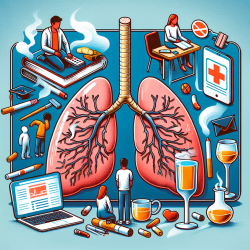Understanding the Impact of Cigarette Smoking and Alcohol Use on Adolescents with Asthma
As a Special Education Director, it is crucial to stay informed about the various factors affecting the well-being of students, particularly those with chronic conditions like asthma. A recent study titled "Cigarette Smoking and Alcohol Use among Adolescents and Young Adults with Asthma" sheds light on concerning behaviors among this vulnerable group.
Key Findings of the Study
The study reveals that adolescents and young adults with asthma are engaging in cigarette smoking and alcohol consumption at rates similar to their peers without asthma. This is alarming given that these behaviors are known to exacerbate asthma symptoms and complicate management. Here are some significant findings:
- Individuals with asthma exhibited increasing rates of cigarette smoking and alcohol use as they aged.
- Adolescents with asthma were more likely to become regular smokers compared to their non-asthmatic peers.
- The asthma group reported higher rates of alcohol-related risk behaviors, such as binge drinking.
Implications for Practitioners
Practitioners working with adolescents with asthma need to be proactive in assessing and addressing these health-risk behaviors. Here are some steps to consider:
- Regular Assessments: Conduct ongoing risk behavior assessments during healthcare visits to gauge participation in smoking and alcohol use.
- Family-Centered Approach: Involve parents in discussions about the influence of household behaviors and provide education on risk reduction strategies.
- Open-Ended Questions: Use open-ended questions to explore the adolescent's experiences with cigarettes and alcohol, and their perceptions of peer and parental influences.
- Smoking Cessation Programs: Offer referrals to smoking cessation programs tailored for adolescents with chronic conditions.
Encouraging Further Research
The study highlights the need for further research to understand the factors contributing to these behaviors among adolescents with asthma. Practitioners are encouraged to delve deeper into this area to develop more effective interventions and support systems.
To read the original research paper, please follow this link: Cigarette Smoking and Alcohol Use among Adolescents and Young Adults with Asthma.










